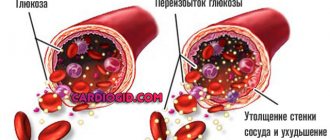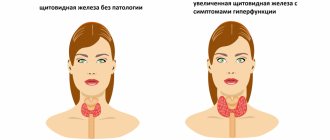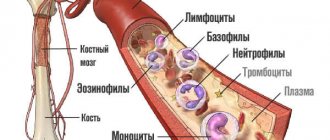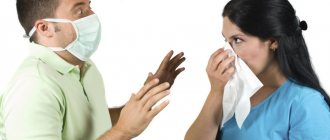A sore throat is an unpleasant, raw sensation in the oropharynx. It is impossible to determine its location with accuracy. The intensity of the manifestation is so great that it causes a cough reflex.
This kind of cough does not carry a positive load, so you need to get rid of it without a doubt. And this can be done by stopping the root cause of the discomfort.
A severe sore throat indicates a whole group of pathological processes of various profiles. The occasionally described manifestation can occur in almost every person, but if there is a constant sore throat, you need to think about visiting a doctor. How to deal with the problem and why does it appear in the first place?
Pathogenesis
Discomfortable sensations arise as a result of damage to the mucous membrane when exposed to plant pollen, tobacco smoke, or dry throat. With an infectious lesion of the respiratory system, the mucous membranes become inflamed, swollen and red; Mucus appears on the walls of the throat, which, when drained, causes irritation, soreness and slight coughing. Later, a pronounced cough appears, which reflexively allows you to get rid of the unpleasant sensation.
Depending on the causes of the main symptom, several risk factors are identified:
- Hypothermia, drinking cold drinks and food, especially in the hot season. All this provokes colds and ARVI.
- Allergic reactions form during the flowering period of plants.
- Contact with infectious patients carries a certain danger, especially with weakened immunity . This is how airborne diseases spread.
- Small parts and toys are dangerous for children - there is a high risk of foreign bodies getting into the oral cavity.
- When laughing, screaming or crying loudly, the vocal cords become overstrained. The mucous membrane dries out and becomes irritated, causing an unpleasant sore throat.
Polluted air can also cause discomfort. Sneezing and coughing occur in dusty, dirty rooms with mold on the walls. When breathing, not only dust, but also a large number of allergens enter the mucous membranes.
Methods for eliminating the disease depending on the cause of the disease
If you have a sore throat you should:
- Quit smoking, drinking alcohol.
- Exclude sour, salty, hot, cold, spicy foods from the menu.
- Be silent no more.
- Drink warm drinks.
The following treatment methods directly depend on the cause that led to this symptom:
- For acute respiratory viral infections and colds, drug treatment is required. Gargling, using throat sprays, and sucking on softening lozenges help a lot.
- If the cause is hidden in a sore throat, then an appointment with an otolaryngologist is required. Then you need to take the medications prescribed by your doctor, rinse, and also stay in bed.
- When an allergy is detected, it is necessary to avoid contact with the irritant and also take antihistamines.
- If you have gastrointestinal diseases, you should visit a gastroenterologist. You should go to bed no earlier than 3 hours after eating. A special diet and sleeping on high pillows are required.
- Those with pharynx neurosis are examined by a neurologist, drink soothing drinks - milk with honey, tea with lemon balm or mint.
- Due to production and environmental factors, it is necessary to reduce the duration of stay in harmful conditions. We also need therapeutic procedures that will help soften the throat mucosa - rinsing, inhalation.
- If the vocal cords are overstrained, you need to give up smoking and long loud conversations (you will have to communicate in a whisper). It is also necessary to humidify the air in the room.
Causes of sore throat
Why does a sore throat, causes of discomfort? Many people ask this question. Among the many reasons, there are 2 main groups:
- infectious;
- non-infectious.
Infectious causes of sore throat and coughing are the results of colds of the upper respiratory tract. The cause of a constant sore throat and coughing may be:
- fungal infections;
- bacterial laryngitis, pharyngitis and tonsillitis ;
- viral ARVI (catarrhal phenomena of the upper respiratory tract).
Why a sore throat without a cold, non-infectious causes:
- Allergic responses of the body to wool, pollen, food, dust, medicines, epidermis of domestic animals. That's why your throat feels sore after eating melon - allergic reactions are to blame. At first glance, it may seem that the melon is causing itching, but in fact the cause may not be the fruit itself, but nitrates and other substances used to accelerate growth and ripening.
- Neurotic reactions.
- Excessive overload of the vocal cords in singers, actors, teachers.
- Inhalation of toxins and irritants: tobacco smoke, vapor from an electronic cigarette, chemical fumes, dry air, too cold air. In addition to the sore throat, patients are very concerned about dry mouth and choking.
- Reflux esophagitis is irritation of the mucous membranes after aggressive exposure to hydrochloric acid, mainly at night, when the body is in a horizontal position.
- Traumatic lesions of the pharynx, entry of foreign bodies. This is one of the most common causes of tickling in a child.
- Pathology of the thyroid gland. Compression of the vocal cords by an overly enlarged thyroid gland leads to a change in voice timbre.
In pediatric practice, discomfort in the throat can be recorded at the initial stages of childhood infectious diseases:
- mumps;
- diphtheria;
- whooping cough, scarlet fever ;
- rubella;
- measles.
Why can my nose and throat get sore?
To inhale air, a person is “equipped” with a device such as a nose. The mouth will also provide air into the lungs, but it is not intended to disinfect it and warm it up. This is done with the help of a richly supplied mucous membrane, which “meets” the incoming air and “transmits” it along a rather long path - from the tip of the nose to the nasopharynx, which anatomically begins at the level of the root of the nose. At the same time, following this path, the gas mixture we breathe is moistened and cleansed of dust particles and large microbes. This is done by cilia - microscopic cylindrical outgrowths on top of the cells of the mucous membrane. They know how to move, and their movement is aimed at exiting the nose. When they cannot “expel” particularly large or numerous irritating particles, they “turn on” the sneezing reflex, aimed at “expelling” them.
What the cilia of the nasal epithelial cells could not remove goes to the next level - into the lymphatic tissue. In the area of the nose and pharynx, it forms a whole ring of tonsils, which “check” the air and the microorganisms contained in it one after another, in several stages:
- First, the air passes through the “control” of the pharyngeal tonsil. This is a lymphoid tissue that, growing in a child, is called “adenoids” (“adeno” - gland, “-idny” - similar, that is, literally “adenoids” is tissue similar to glandular tissue). Adults do not have adenoids;
- the air mixture goes further to the oral cavity, bypassing the islands of lymphoid tissue located on the back wall of the pharynx (“tube” from the nose to the larynx that connects the nose and mouth);
- then the air passes past the palatine tonsils (these are the ones we see when we open our mouths in front of a mirror and breathe through our mouths);
- simultaneously with the palatine tonsil, the lingual tonsil cleanses from microbes;
- Further, the absence of germs is carried out by paired tubal tonsils, but they are more focused on keeping germs out of the ear, so they are not closely involved in the air mixture.
The muscles are not involved in the process of inhaling air, so they are not present along the nasal cavity, along the pharynx and to the larynx. The wall of the pharynx consists of only two layers: the mucous membrane and the fibrous membrane. Nerve endings from the cranial nerves, which provide sensitivity to this area, are suitable here.
Let's move on to the question of why there is a sore throat directly. The causes of this symptom can be divided into several groups:
- Drying of the mucous membrane of only the nasopharynx or oropharynx. This is caused by some medications, dry air, tobacco, harmful chemicals contained in the air (paints, chlorine-containing substances, fragrances, etc.), especially if a person breathes them chronically).
- Irritation of the oropharyngeal mucosa. This is especially often done by hydrochloric acid, which is thrown here from the stomach (if this condition exists constantly, it is called gastroesphageal reflux disease, but a similar situation can develop acutely - when taking a horizontal position after eating and drinking alcohol).
- Inflammation of the mucous membrane of the oropharynx: infectious (these are ARVI group viruses, bacteria, less often fungi) and non-infectious, for example, with an allergy to a substance contained in the air.
- Impaired blood supply to the mucous membrane.
- Tumors developing from the fibrous membrane.
- Disruption of the brain, which processes sensations coming from this area.
- Malfunction of the nerve endings approaching the area behind the tonsils.
The most common causes of a sore throat are infectious inflammation of the tonsils (tonsillitis) and the back wall of the pharynx (pharyngitis). Here you need to act quickly so that the infection, which has been inhibited by the tonsils and smaller lymphoid tissue, does not go down to the bronchi and lungs. Therefore, below we will look at the main causes, their symptoms and differences from each other.
Symptoms
Symptoms largely depend on the cause of the discomfort. The initial subjective sensations in patients are almost always similar, only the objective changes in the throat itself during examination and the accompanying symptoms differ.
The patient feels that he constantly has a sore throat and the symptom does not go away for a long time. The sore throat is often accompanied by coughing and coughing. Rarely, there is an increase in temperature, a feeling of heat and dry mouth, a runny nose, symptoms of intoxication, and hoarseness.
Local changes in the throat:
- redness (hyperemia) and swelling of the mucous membranes;
- the presence of white plaque, mucus of varying thickness, pinpoint hemorrhages or pus on the mucous membrane.
Associated symptoms help establish an accurate diagnosis. For example, with pharyngitis (an inflammatory disease of the pharyngeal mucosa), the patient is bothered by a dry cough, sore throat, redness of the mucous membranes of the pharynx, and rarely, sore teeth.
With laryngitis (inflammation of the mucous membranes of the larynx), severe pain in the throat, hoarseness of the voice until it completely disappears, cough (dry or wet), increased body temperature and hardening of the vocal cords.
With tonsillitis (inflammation of the tonsils), the temperature immediately rises, the disease begins acutely, the patient is bothered by chills, pain when swallowing, ulcers, plaque and films appear on the enlarged tonsils.
A dry cough is the most common accompanying symptom of sore throat. A reflex cough helps the patient to get rid of discomfort in the throat for a short time.
Possible diseases
A sore throat and the urge to cough periodically bother adults and children of all age groups. The appearance of such signs is often associated with the onset of the development of diseases that disrupt the functioning of the respiratory system and act as an acute or chronic irritant of the laryngeal mucosa.
The table below shows the types of diseases, as well as pathological conditions of the body, the presence of which leads to a feeling of tickling and provokes a dry, incessant cough.
| Name of the disease | Characteristics and clinical manifestations |
| Acute respiratory viral infection (ARVI) | The most common cause of a sore throat. It most often occurs in the autumn and winter periods of the year, when there is a surge in the activity of pathogenic microorganisms (bacteria, viruses) in the environment. The disease is spread by airborne droplets during a conversation with an infected person. When examining the patient's throat, redness of its back wall is observed, and a rash and abscess formations may appear. A dry cough lasts about 3-4 days, and then changes to a productive cough with further sputum discharge. |
| Cold | The most harmless reason for the development of symptoms associated with a sore throat and the urge to cough. It occurs as a result of prolonged hypothermia of the body, prolonged exposure to the street in damp and cold weather. Inflammation of the mucous membrane of the throat and upper respiratory tract is short-term in nature and lasts no more than 3-5 days. The patient does not require specific therapy, and the urge to cough is felt no more than 6 times within 1 hour. |
| Gastroesophageal reflux | Disorders of the digestive tract, when a spasm of the gastric sphincter occurs, separating its contents from the cavity of the esophagus. There is a release of hydrochloric acid, gastric juice and particles of undigested food. This pathological process leads to irritation of the mucous membrane of the throat, redness of its tissues, soreness and periodic coughing. After restoration of digestive function and elimination of stomach spasms, these symptoms disappear, and the surface of the larynx again acquires its previous pink appearance without signs of a chemical burn. |
| Peritonsillitis | This is a disease that is a complication of chronic tonsillitis of bacterial origin. The causative agent of the disease is a microorganism - Staphylococcus aureus. With paratonsillitis, the inflammatory process moves from the tissues of the tonsils to the lower parts of the larynx, forming a purulent abscess. The development of the disease is manifested by severe sore throat, difficulty swallowing and periodic coughing. Then painful symptoms and acute inflammation appear. The pathology requires surgical intervention with sanitation of festering tissue, as well as the use of potent antibacterial agents. |
| Throat cancer | The most dangerous, but not the most common cause of a tickling sensation and the urge to have a dry cough. The pathology is characterized by the degeneration of epithelial cells of the larynx into cancerous ones, the presence of which leads to their uncontrolled growth and tumor formation. As the extraneous tumor increases, the patient’s well-being deteriorates. The sore throat changes to a feeling of suffocation, and the dry cough only intensifies, reminiscent of a dog barking. |
| Thyroid goiter | It develops as a result of pathological enlargement of thyroid tissue and the appearance of nodules. It can have a benign or malignant etiology, cover only one lobe of the organ or affect both parts. An enlarged thyroid gland exerts static pressure on the nerve endings responsible for the sensitivity of the tissues of the larynx, causing their irritation. All this leads to a constant or periodically occurring feeling of tickling and coughing. After drug therapy and a decrease in the volume of the thyroid gland, these symptoms appear less frequently or disappear completely. |
| Allergy | Together with ARVI, it is the most common cause of sore throat and dry cough attacks. It worries people who have an individual intolerance to certain types of food; their body reacts negatively to excess accumulation of household dust, hair from domestic and farm animals, pollen from flowering plants and trees. Allergens accumulate in a person’s blood and also settle on the surface of the mucous membrane of the larynx during breathing. As their numbers increase, the effect of irritation and extensive allergic reaction occurs. In the early stages of its manifestation, it is expressed only in a feeling of tickling and coughing. In the absence of adequate drug treatment, the pathology acquires more dangerous manifestations and can cause bronchial asthma. |
| Tracheitis | Inflammatory disease of the tracheal mucosa. In most cases, it is of bacterial origin and develops as a result of the entry of infectious microorganisms into the cavity of the upper respiratory tract. A sore throat and barking dry cough bother the patient for 5-7 days, and with a properly formed course of therapy, it soon becomes more moist and disappears completely. |
| Helminthiasis | A parasitic disease, the advanced form of which leads to the migration of worm larvae from the digestive tract to the organs of the respiratory system. The entry of helminths into the bronchopulmonary tissue occurs along with the flow of venous blood. The movement of parasites causes bronchial spasm and dry cough. The latter, in turn, causes a sore throat. Most often, such symptoms are caused by helminths - roundworms. |
A sore throat and coughing are not an independent disease, but are symptoms of one or more other diseases of the tissues of the larynx, respiratory tract and digestive tract. Elimination of the main cause that caused the occurrence of painful symptoms accelerates the process of recovery and restoration of the laryngeal mucosa.
Tests and diagnostics
Diagnostics are carried out to accurately diagnose and prescribe timely, adequate treatment. Diagnosis begins with the collection of all accompanying symptoms, an objective examination and a description of changes in the throat during a visual examination.
Tests that must be completed to confirm the diagnosis of bacterial, fungal, viral or allergic etiology:
- General blood analysis. During a viral infection, the number of white blood cells and leukocytes remains within normal limits or decreases slightly. At the same time, the number of monocytes and lymphocytes increases, and the content of neutrophils decreases. The ESR does not change.
- General urine analysis. All indicators are usually within normal limits; analysis is performed for differential diagnosis.
- Microflora smear from the nose and throat. If diphtheria or whooping cough is suspected, testing is required. After taking a smear, a special microscopic examination is carried out: the material is applied to a glass slide, stained and examined for staphylococci, streptococci, Escherichia, Klebsiella, Neisseria, etc. Bacterial culture allows you to determine the exact type of pathogen and select the most effective antibiotic .
If this symptom appears, it is recommended to consult an ENT doctor (otorhinolaryngologist) for a visual examination of the throat by a specialist. The doctor will help determine the cause of this symptom and prescribe appropriate treatment (elimination of the foreign body, medications for soreness). If pathology is detected in the lower parts of the respiratory system, allergies, or childhood infections, the doctor will refer you for a consultation with an allergist, infectious disease specialist, therapist or other specialist in the field.
ethnoscience
In alternative medicine there are various methods that reduce the intensity of the disease or completely eliminate the soreness. This may include:
- Drink plenty of fluids. It is advisable to drink raspberry and herbal tea, decoctions based on rowan berries and rose hips.
- Performing herbal medicine. Onion and garlic juice, eucalyptus and pine needle oils should be sprayed into the air.
- Use for rinsing diluted beet juice, ginger.
- Applying compresses made from vodka.
Excellent results are achieved using a treatment based on badger fat, lemon juice and honey. The components must be mixed in an amount of 2:1:1. The product should be taken 1 tsp. 3 times a day on an empty stomach.
Procedures and surgeries, physiotherapy
What to do if you have a sore throat and dry cough? Treatment can be supplemented with physiotherapeutic procedures. This safe method allows using thermal, electrical and mechanical energy to influence the course of biological processes in the human body.
Physiotherapeutic treatment of sore throat with dry cough includes the following procedures:
- laser therapy;
- aerotherapy;
- EF irradiation of mucous membranes for the purpose of bactericidal effects;
- medicinal electrophoresis with Novocaine , Hypercortisone , Novocaine , Calcium iodide and Nicotinic acid ;
- inhalations with alkaline and oil solutions, interferon and anti-inflammatory drugs;
- UHF and ultrasound therapy for the larynx area.
As a result of the use of physiotherapeutic procedures: local blood circulation improves, pain syndrome decreases, and well-being improves due to the bactericidal and anti-inflammatory effect. To achieve maximum results, physiotherapy must be combined with the use of medications.
Medicines
To eliminate soreness, medical products with emollient properties are used. They help eliminate inflammation in the area of irritation and relieve discomfort. The most effective means are:
- Antihistamines. They help reduce swelling, inflammation, and eliminate irritation. Fast-acting 1st, 2nd and 3rd generation antihistamine medications are used: Suprastin, Tavegil, Diazolin, Pipolfen, Loratadine. For treating children and the elderly, it is better to choose medications in the form of syrups and drops for easier dosage calculation. For adults, tablets are more suitable. It should be taken into account that taking 1st and 2nd generation drugs leads to a sedative effect, which affects performance and concentration.
- Preparations for resorption in the form of tablets, lozenges, cough drops. These include “Strepsils”, “Faringosept”, “Lizobakt”, “Doctor MOM”, “Neo-Angin”. When purchasing such products, you should read the instructions, which will help you understand the composition and dosage. The main components may be antiviral or antifungal substances. If the tickle does not appear from an acute respiratory infection, then menthol lozenges are needed. Children under 5 years old should not be given drugs from this group. Kids do not chew the “candy,” but swallow it. There will be no benefit from this.
- Sprays that eliminate irritation. This group includes products with lidocaine, as well as antibacterial or antiviral medications. Often prescribed are Strepsils Plus, Theraflu Lar, Septolete Plus, Ingalipt, Orasept.
- Drugs used to treat tonsils. Often such drugs are used in the treatment of children's throats. These are Hexoral, Lugol, Chlorophyllipt oily.
Doctors prescribe drugs from these groups to treat tickling if it is not a symptom of acute respiratory infections. When the mucous membrane is irritated, positive conditions are provided for re-infection - the activity of opportunistic flora, which is constantly present in the human body, increases. To prevent a fungal or bacterial infection from appearing, the soreness must be eliminated.
How to treat a sore throat that causes coughing with folk remedies
What to do if a sore throat causes a cough, how to treat it with folk remedies? For patients who trust folk remedies, several recipes have been developed that help in the fight against the disease, help soften the throat, and alleviate the course of the disease. Garlic and onions contain natural phytoncides, which have bacteriostatic and bactericidal effects, thereby providing protection to the body.
- Butter and onion. Fry 2 onions in a glass of unrefined sunflower oil until crispy, strain the oil through cheesecloth and cool the resulting mass. You should gargle with the resulting product three times a day. The recipe is also effective for sore throat.
- Honey in juice. Dilute 1 tablespoon of honey in a glass of carrot or beet juice and drink the resulting solution for 5-7 days before bed.
- Sage solution. Dissolve 1 teaspoon of dry sage in a glass of boiling water and leave for 15 minutes. You need to gargle 5-6 times a day for a week.
- Infusion of calendula and chamomile. Pour a glass of milk into 1 tablespoon of the dry plant mixture and leave for half an hour. You need to gargle with the resulting solution 3-4 times a day for 5 days.
- Milk and radish juice. Mix black rare juice and milk in a ratio of 1:5 and drink warm before bed.
- Garlic. Before going to bed, take 1 clove of garlic into your mouth and periodically bite it until the juice comes out. Garlic contains allicin , which has a pronounced bactericidal effect. You can mix 1 ml of garlic juice and 5 ml of apple cider vinegar in a glass of warm water. You need to gargle with the resulting solution once before going to bed. If you have a sore nose, treatment is also effective.
It is better to consult a pediatrician about whether it is possible to use folk remedies and how to treat tickling in a child. In a child, dryness may be the first sign of a serious illness for which traditional methods are contraindicated or ineffective. During pregnancy, preference is given to folk remedies, but treatment should also be agreed with your doctor.
Gargling when you have a sore throat: how to do it correctly?
Before you begin the rinsing procedure, there are several important points to consider:
- When gargling, it is necessary to take into account that some tinctures and herbal decoctions dry out the throat, so you should not abuse them.
- The body quickly gets used to rinses, so they need to be alternated.
- Give the necessary time to rinse. Rinse your throat thoroughly, otherwise you will not achieve results.
Gargle
- One rinse a day is not enough. It is necessary to perform the procedure every 2-3 hours.
- The temperature of the rinse liquid should be comfortable. A hot decoction can burn your throat, while a cold one will be less effective.
- Do not eat food immediately after rinsing. It is better to reinforce the effect with a tablet or spray.
First aid if you have a sore throat and want to cough
If you constantly have a sore throat and want to cough, then a specialized examination is needed to find out the cause and find out why you want to cough. As first aid when a symptom appears, it is recommended to drink a warm drink (tea, water, herbal infusion), which will increase blood flow to the mucous membranes and help soften the throat.
Very sore throat
If you have a very sore throat and cough, what should you do in such a situation? A dry cough may be a sign that the infection has spread to the lower respiratory system. Severe tickling and cough can be quickly relieved by taking lozenges and absorbable tablets, which will temporarily alleviate the condition.
Treatment
You can get rid of an unpleasant symptom in various ways. Their choice depends on the factor that caused the pathology.
If the cause is a disease, then the doctor treats it by prescribing the parallel use of various medications for tickling (rinses, inhalations). They are used to soften, moisturize the mucous membrane, and reduce the intensity of unpleasant sensations.
If you constantly have a sore throat, you should not self-medicate. This can aggravate the developing pathology and lead to complications.
Prevention
Basic recommendations for prevention:
- avoid drafts and hypothermia;
- quit smoking, avoid being in a smoky room;
- do not abuse cold foods and drinks;
- regularly carry out wet cleaning in the house and ventilate the bedroom before going to bed;
- use personal protective equipment (masks) during an epidemic of influenza and ARVI, avoid crowded places;
- harden the body, eat right, take vitamins .
Diagnostics
A sore throat and coughing are signs of illness that require a thorough examination.
To determine the causes of these symptoms, the following diagnostic methods are used:
- external examination of the surface of the mucous membrane of the back wall of the throat;
- endoscopic examination of the lower parts of the larynx, which makes it possible to study in more detail the condition of the tissues of this part of the body (a special probe equipped with a digital video camera is used, which is inserted into the throat cavity and transmits a high-quality image to a computer monitor);
- donating capillary blood from a finger for clinical analysis;
- collection of morning urine to study its biochemical composition;
- Ultrasound of the thyroid gland;
- a smear from the surface of the mucous membrane of the throat, which is sent to the laboratory to determine the possible presence of pathogenic microflora;
- collection of venous blood to carry out its biochemical examination for dangerous bacterial infections, which can also cause redness and inflammation of the throat tissues, cause soreness and the urge to dry cough (tuberculosis bacillus, HIV, syphilis);
- scraping for helminth larvae.
In addition, the doctor performing the examination listens to the patient’s complaints, establishes the date, time and circumstances under which the tickling and coughing occurred. Having the results of a diagnostic examination in hand, the doctor makes a diagnosis and then creates a therapeutic course plan.
In a public hospital, the above examination methods are carried out free of charge. In a private clinic, a comprehensive diagnosis of the entire body and laryngeal tissues will cost from 3,000 to 5,000 rubles.
The child has a sore throat
Causes of a sore throat in a child:
- With laryngitis in young children, as a result of swelling of the mucous membranes of the larynx, the supply of oxygen may be cut off. The first symptoms to pay attention to are: restlessness, excessively noisy breathing, crying, difficulty breathing.
- With angina (tonsillitis), pain in the epigastric region, vomiting and nausea are additionally observed.
- With ARVI or parainfluenza a false croup can form, which requires urgent help from doctors who will tell you how and how to treat it.
- Often a child coughs, as if his throat is sore after laughing loudly, crying or laughing due to excessive strain on the vocal cords.
If a child constantly has a sore throat, then the cause may be allergies or diseases of the digestive tract.
Allergic reactions
Allergies are in second place in the frequency of provocation of the symptom of prolonged soreness. Especially often we are talking about the initial manifestations of bronchial asthma or Quincke's edema.
It is extremely rare for a simple allergic reaction to manifest itself this way. The immune response has a mixed origin, as a rule, it is brought to life by nutritional factors (poor nutrition), interaction with dust, pollen.
An allergy develops as follows:
- A substance that is a so-called antigen enters the body. It is an allergen in its essence, or, in other words, a structure to which the patient has a reaction.
- The immune system mistakes a sometimes harmless substance for a dangerous invader and produces specific immunoglobulins and antibodies. They, like the key to antigens, are integrated into their structure and become a single whole, forming a special complex.
- These structures settle on tissues, destroying mast basophil cells. A large amount of histamine is produced, it is a mediator of inflammation and actively destroys cells.
- The result is pain, intense sore throat, a raw, itchy feeling, and coughing.
Symptoms often accompanying allergies include shortness of breath (increased number of respiratory movements per minute), suffocation (disturbances in normal respiratory activity).
The patient cannot breathe normally. This is a dangerous manifestation. Therefore, allergies of any nature are treated strictly under the supervision of an immunologist or allergist. We may well be talking about complex diseases. Which ones have already been said.
Sore throat during pregnancy
Quite often, expectant mothers do not take it seriously when they have a sore throat and want to cough. Any colds or viral infections can harm the health and development of the unborn child.
Treatment of a throat caused by inflammation due to an infectious disease cannot be postponed, especially during pregnancy . If the infection goes lower, this may require the prescription of antibiotics , the choice of which the doctor must take with special responsibility.
Which specialist should I contact?
Diagnosis of pathological processes is carried out by specialists of various profiles.
- If there is a problem with the gastrointestinal tract, you will need to consult a gastroenterologist.
- If you have allergic pathologies, you cannot do without consulting an allergist-immunologist.
- Innervation disorders are treated by neurologists.
- Tumors are the field of activity of oncology specialists.
- Finally, infectious diseases are treated by general practitioners.
First of all, it is recommended to see a doctor of the widest possible profile. That is, the therapist. He is a kind of beacon. A general practitioner carries out initial routine measures, determines the nature of the pathological process and refers the patient to specialists.
At the initial appointment, any doctor asks questions about the state of health, complaints, their duration and nature.
An anamnesis is collected (the doctor finds out what the person was or is sick with). It is mandatory to establish the presence of allergies and previous infectious diseases.
Consequences and complications
It is generally accepted that a sore throat is not a disease, but only a symptom of a certain disease. If you do not find out the true cause of the tickling, you can waste your time on incorrect and ineffective treatment and provoke the development of consequences. This mainly concerns young children, because it is in this group of patients that the infectious process quickly spreads to the lower parts of the respiratory system and causes a pathological process:
- bronchitis;
- pneumonia;
- tracheitis.
If in the first stages it is still possible to do without drugs, then if complications develop, adequate drug treatment is required. Also, if the diagnosis is incorrect and inappropriate treatment is prescribed, long-term consequences may develop: diseases of the renal system ( glomerulonephritis ), heart ( myocarditis ), connective tissue ( rheumatism ).
Endocrine disorders
The leading endocrine disorder that provokes a sore throat for several months has been and remains goiter. Goiter is a pathological growth of the thyroid gland under the influence of pathogenic factors.
Usually as a result of excess thyroid-stimulating hormone. There are two types - diffuse, when the entire organ or its individual parts grow due to excessive division of organ cells, or nodular, when individual small nodular inclusions are formed.
Sooner or later, the patient will begin to be bothered by a cough. Based on some additional signs, it can be recognized that the reasons for this are precisely thyroid problems. Read more here.
We can also talk about cysts. All these structures are capable of “pressing” the larynx, causing a false sensation of tickling. However, this phenomenon only gets worse over time.











